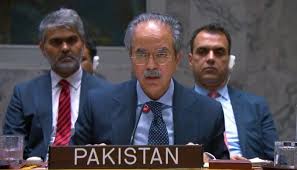ISLAMABAD – In response to fresh terror attacks by militants based in Afghanistan, Pakistan has warned the United Nations about the TTP threat from Afghanistan. The country urged the UN to act now and stop Afghanistan from becoming a breeding ground for terrorism.
Pakistan’s Permanent Representative to the UN, Asim Iftikhar Ahmad, addressed the UN General Assembly’s plenary session on the Afghan issue. He said, “We must ensure that Afghanistan does not become a hub for terrorists who threaten its neighbors and the world.”
The envoy’s remarks reflect Pakistan’s consistent position. Islamabad has repeatedly condemned the use of Afghan territory by terror groups to launch attacks across the border.
Just last week, Pakistani security forces killed at least 30 militants trying to cross from Afghanistan into North Waziristan. These fighters were reportedly linked to India-backed groups. The operation took place in Khyber Pakhtunkhwa near the shared border.
Since the Taliban took control in August 2021, Pakistan has seen a rise in TTP-linked terrorism. Most attacks have occurred in Khyber Pakhtunkhwa and Balochistan. Despite recent military tension with India, extremist violence in May 2025 also slightly increased.
A day before the UN address, Pakistan and Afghanistan held their first meeting under a new mechanism involving foreign ministries. Talks in Islamabad covered security, trade, and regional links. Both sides admitted that terrorism poses a serious risk to peace in the region.
During the meeting, Pakistan demanded firm action against terrorists based in Afghanistan. Officials noted that these groups are harming Pakistan’s security and blocking progress in the region.
At the UN, Ambassador Iftikhar elaborated on the TTP threat from Afghanistan. He warned that the danger coming from Afghan soil is very real, especially for Pakistan. He added that Daesh, Al-Qaeda, the TTP, and Baloch separatists still operate from areas in Afghanistan with no state control.
The diplomat stated that TTP remains the largest UN-listed terror outfit in Afghanistan. He said it currently has nearly 6,000 trained fighters. “Afghanistan must not become a safe haven for terrorism against any country,” he stressed.
The ambassador also warned about cross-recruitment between TTP and Daesh. He called this trend a global and regional security risk. He said, “The TTP threat from Afghanistan endangers not just Pakistan, but the whole region.”
He then highlighted how these terror outfits are now using modern weapons and equipment. In the past two weeks, several complex attacks were launched in Pakistan using such arms.
“These incidents show how serious the threat has become. Pakistan will continue all efforts to protect its people,” the ambassador assured.
He also spoke of clear links between TTP, Balochistan Liberation Army (BLA), and the Majeed Brigade. He claimed these groups are trying to target key infrastructure and disrupt Pakistan’s economic future.
“Sadly, Afghan territory is still being used by these terrorists, often acting as proxies, to target other nations — especially Pakistan,” he added.
Touching on humanitarian concerns, the envoy reminded the UN of the burden Pakistan has carried. He said the country has sheltered Afghan refugees for decades.
He noted that since the Taliban takeover, another one million undocumented Afghans entered Pakistan. This has caused law and order problems and increased pressure on resources.
Pakistan asked the international community to share this burden more fairly. The ambassador called for steps to revive the Afghan economy. He urged global support for restarting banking systems and unfreezing Afghan assets.
He also stressed the importance of economic ties and development. Pakistan remains committed to regional projects such as TAPI, CASA-1000, the Uzbekistan-Afghanistan-Pakistan railway, and extending CPEC to Afghanistan.
He said these projects could bring peace and progress to the region. He acknowledged that Afghanistan has seen a rare period of peace since the Taliban takeover.
“For the first time in over 40 years, there is no war in Afghanistan. There is now a chance for peace — if we engage wisely,” the envoy stated.
He closed by urging the world not to abandon Afghanistan. He said dialogue and realistic diplomacy are the only way to build a peaceful and inclusive Afghan state.


